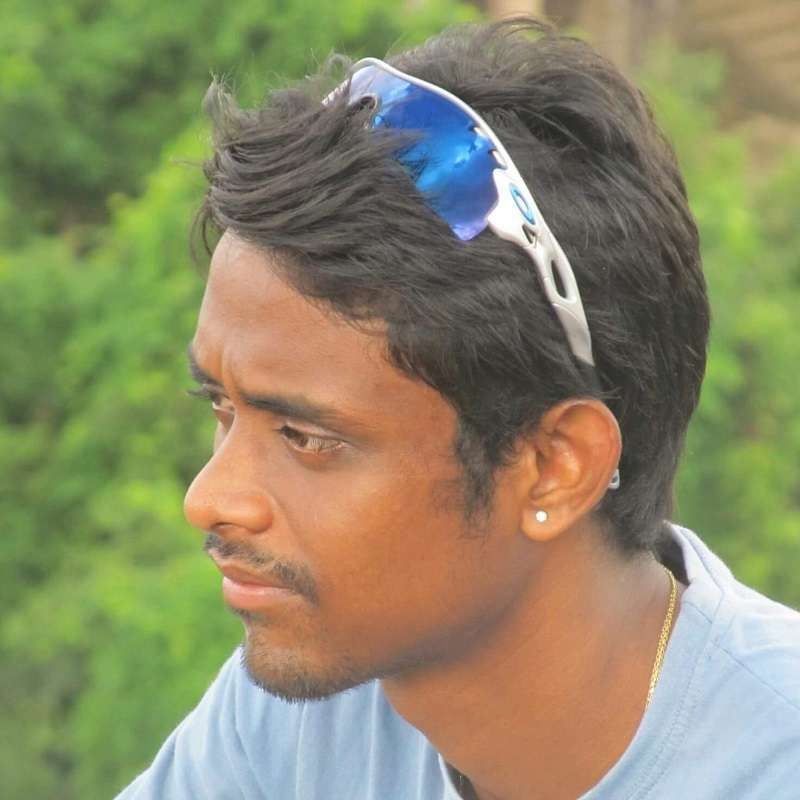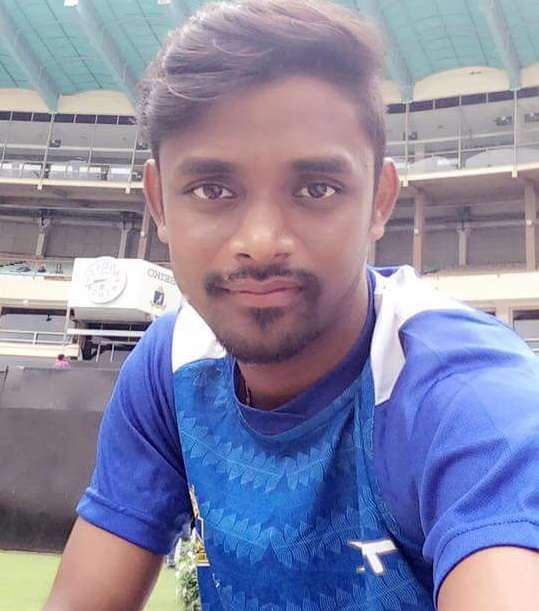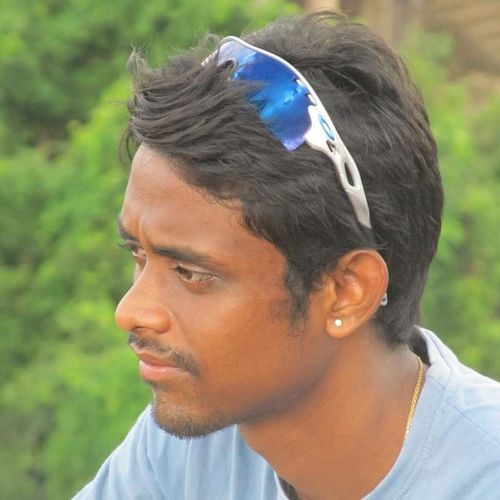
Naxalism, violence and cricket: The life and times of Satyabrata Murmu
On a Thursday afternoon, I headed to the heart of Kolkata and arguably its most popular tourist destination, Park Street. Known for its nice blend of fine dining, attractive retail and happening nightlife, the area has been the hubbub of activity since the early-1940s.
Today, half a decade into the 2010s, there’s little that’s changed about the place. From the young to the old, the rich to the aspirational, lovers to loners, foodies to shopaholics, Park Street continues to offer that unmatched charm.
It is at popular intersection here, right next to the iconic and often unaffordable Flury’s bakery, that I came face to face with Bengal’s first cricketer from the tribal belt, Satyabrata Murmu.
Murmu, 26, hails from the sub-divisional municipality called Jhargram, located in the West Medinipur district in Bengal. The contrast between Park Street and Murmu's birthplace couldn't have been more stark. Park Street has its plush food destinations and upper class lifestyle, while Medinipur lies in the tribal belt.
But the district is unique in its own way; known for producing exceptionally gifted people like Iswar Chandra Vidyasagar, Medinipur stands out from its surrounding areas because of its deep-rooted culture, favourable treatment of the girl child and above average literacy rate.
Its notoriety however, lies in its proximity to the Naxalbari movement. What started as a peasant revolt in the 1970s in a town which lent its name to the movement, eventually led to a full-fledged class war, resulting in years of relentless and bloody conflict between the indigenous communities and the state. At the forefront of it all was a faction of the Communist Party of India that believed in mobilisation to protect the interests of the peasants and labour classes, and who wanted to achieve their goals through violent and non-institutionalised means.
Stuck in the cross-fire were generations of promising youngsters like Murmu who, in the wake of all the chaos surrounding them and also because of the dearth of opportunities, were forced to pick up the conventional paths that life often threw up.
The fact that development was lagging in West Medinipur never affected Murmu. The son of a retired bank serviceman, hailing from a middle-class background, he knew that cricket was his calling from a very young age. “I was addicted to the sport right from the start. No matter where I was, I used to make it a point to be in front of the television when the match was on; it was a kind of an unexplainable addiction.”
Sometime in 2002, a cricket coaching camp under the tutelage of Kanu Chakrabarty opened up in Jhargram, and naturally Murmu jumped at the thought of being a part of it. “I told my father that I wanted to be enrolled, and he took me there. That’s where I realised how much I loved playing the game. There were days that even after my session was over, I hung around in the field, just to watch others go about with their practice; I still remember how sweet the ball hitting the bat sounded to me back then.”
Chakrabarty, who hailed from Jamshedpur in the neighbouring state, used to visit Jhargram once a week to coach the young hopefuls. And it was largely due to him that Murmu got to play his first cricket tournament as a 12-year old, albeit against players twice his size – with some even having played for the Jharkhand state side. “After playing for the junior teams in the tournament, I was drafted into the senior sides and got to play against these players. It was there that I first met and played against Varun Aaron; he used to be an all-rounder back then,” Murmu quipped.
It helped that his parents shielded him from the realities of life. “There must’ve been some financial difficulties,” he said. “But my father never let me get affected by that. In fact, he was most encouraging and wanted me to play the sport well, quite unlike many around us in those days.”
Murmu was first spotted as a Bengal prospect in 2004 on the back of strong performances for the Jhargram Cricket Club in the Cricket Association of Bengal age-group league. Aged 14, Murmu made it to the U-15 state trials where he competed with around 200 others for a handful of spots. “The initial trial happened outside the Eden Gardens, in the Customs’ ground, and it went well. I was then called up for the trial game at the Eden Gardens. I had always dreamt of playing in the stadium, and seeing my wish fulfilled was an inexplicable feeling.”
All the players who were going to be a part of the trial match were lodged in the stadium itself. And it was on the eve of the match, so close to realising his longstanding dream, that Murmu sat in a state of non-activity, soaking every bit of the experience. “After our practice got over that day, from around seven in the evening, I sat there in the players’ gallery, alone and in complete darkness. Possibly the youngest there and a bit overwhelmed by whatever was happening around me, I spent that solitary moment just etching everything into my memory.”
The match on the following day though was something of an anti-climax. While he was expecting a long gruelling session and a comprehensive evaluation, Murmu was in for a mild surprise when the coaches called him off the pitch after he faced only four deliveries. “I hit two boundaries, defended one and took a single off the last ball I faced. On seeing that, the coaches called me back and the next batsman was sent in. I was afraid that they didn’t like my game as everyone else got to play a whole lot of deliveries while I was called out so quickly.”
However, when the final list of those selected came out, Murmu featured in the 20 slated to go to Bangladesh for a tournament. “My father was exceptionally happy that day and that was expected. But my mother, who was usually a little lukewarm towards me playing the sport, gave in to her emotions; it was touching when she asked me to give the game everything.”
Playing for the state’s junior side meant that Murmu had to spend a lot of time away from home, in Kolkata, plying his trade in the second division of the CAB senior league. To stay in constant touch with the game and in order to keep growing, he enrolled himself in Sourav Ganguly’s Videocon Cricket Academy.
While staying away from home in the city was challenging in itself, the efforts intensified during the off-season when club cricket came to a halt in Bengal. “It was then that I had to travel a lot, frequently shuttling between Kolkata and Jhargram.”
Murmu in fact had to catch a 5:30 AM train from Jhargram and report to his cricket academy by 10:30 AM, after nearly five hours of travel. After the completion of practice, irrespective of the situation, he had to leave the ground by 3:00 PM and head to the railway station. “The last train to Jhargram was at 5:00 PM in the evening, and if I missed it, I couldn’t go back home.”
It’s natural to think that Murmu would go back home and rest after more than 12 hours of physical exhaustion. But that wasn’t the case, as he knew he had to study as well. “I couldn’t let my academics hamper, so I used to attend tuitions after going back home. While I wasn’t as good a student as I used to be till the 10th standard, I tried to balance both spheres of my life in classes 11 and 12.”

From U-15, the transition to U-17 was natural but not easy. “Ahead of the under-17 trial, I fell sick and had to be hospitalised. I was put on intravenous (medication) and as a result ended up straining my arms. On the day I got discharged from the hospital, I received a call from one of the coaches, asking me if I’d be able to attend the camp in Krishnanagar. My mind instantaneously agreed to the idea of it, and the very next day I was heading for the camp, despite having just recovered from a medical condition.”
While you'd think that he wouldn't have been fit enough for the game, Murmu not only played but also performed. “I loved the game and perhaps that was the cure I needed, don’t remember how and when the strain disappeared, I just knew that it did.”
Murmu received two rewards for his strong showing in the trial game. Not only was he rested from the subsequent games, he soon had a fleeting encounter with one of his idols, Sourav Ganguly, which left him thoroughly inspired.
U-19 was next for Murmu, but since then he’s largely lived under the shadows of Wriddhiman Saha and Shreevats Goswami. He came closest to a first-class debut in 2014 when he made it to the Bengal Ranji team as a reserve.
The elephant in the room, or rather elephants, are the two facets of Murmu’s background that make his story particularly poignant. Cricket as a sport can drive away social barriers in the country, and his life demonstrates that perfectly.
Murmu hails from Jhargram, which by his own admission was peaceful during his childhood but turned awfully bad just when he was entering his teens. A failed attempt on the life of West Bengal’s Chief Minister led to a severe armed crack-down on the rebels in major parts of the state. The movement got scattered, and soon the Maoists took refuge in Jhargram, making it the new centre of their operations, away from traditional places like Lalgarh.
Life almost came to a standstill, with all major functions and events taking place in the daylight under the watch of security forces. “Even marriages, usually held in the evenings, started happening in the mornings, but there were police forces everywhere,” said Murmu. Cricket too, took a beating as tournaments soon started getting cancelled, and one by one, youngsters dropped out of coaching centres.
Amid all this, Murmu felt a lot of pressure, “Of course there was pressure and at times I questioned why I was doing this. Even going to the club was a pain as we were often stopped by police pickets. At every stage, we were asked what we were doing, where we were headed, made to open our large kitbags to reveal the items inside; things weren’t easy anymore.”
But Murmu persisted, possibly because he was a one-of-a-kind individual or maybe because others didn’t get the kind of support he got from home. And his background – his status of a tribal member – made him commit to the sport like he had never committed to anything in his life.
“As a kid, when in school, other children were often told by their parents not to mix with me. I didn’t understand the gravity of it that much, and I am glad I didn’t. But thankfully, that was all that it was limited to.”
It didn’t take much time for the same people to change colours when success came Murmu’s way, “Now all of them visit my home day and night. My rise to becoming a state player has led them to change their opinions about my desirability all of a sudden; (it) shows how people in reality are.”
Employed with the Reserve Bank of India currently, Murmu told his bosses that he would quit the job if his playing activity was hampered in any way. And his bosses wouldn’t mind, as Murmu is currently engaged in the month-long Karnataka State Cricket Association Invitational Tournament with the Bengal team. The icing on the cake is his elevation to the first-choice wicket-keeper status after Goswami, the regular keeper in the absence of Saha, was overlooked for this tournament.
“It feels good to have outrun a good player like Shree (Goswami) to the spot, and I have to make the most of this opportunity. But I am not worrying whether I am permanently going to be the first choice or not,” Murmu said before leaving for Bengaluru.
If all goes well, Murmu might return to Kolkata next month placed ahead of others in the pecking order. But irrespective of whether a first-class or IPL debut happens or not for this twenty-something, Murmu will be mighty pleased with himself for whatever he has managed to achieve so far. From the rut and wreckage of a small town, he has risen to the top having fought all the kinds of obstacles that life could possibly throw up.
Today, Murmu lives in Salt Lake City, Kolkata’s most prominent suburb, some 200 kilometres away from his family in Jhargram. But his journey has been far greater than those 200 kilometres, and is one of the most fascinating stories that Indian cricket has thrown up in a very long time.
